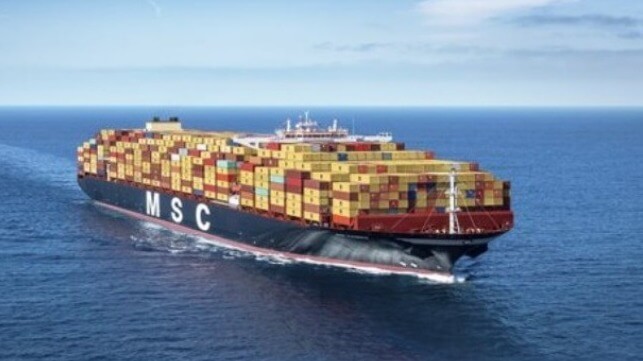MSC Commits Money and Resources to Singapore's Decarbonization Center

Mediterranean Shipping Company (MSC) is accelerating its public efforts to support the green transition in the commercial shipping industry announcing a new five-year Impact Partnership agreement with Singapore’s Global Centre for Maritime Decarbonization (GCMD). A non-profit started in August 2021, the center was founded with the support of industry leaders to aid in the development and testing of green solutions and shaping standards for future marine fuels.
By joining forces with GCMD, MSC is strengthening its commitment towards a collaborative approach to decarbonization the partners said. As an Impact Partner, MSC will provide cash contributions toward GCMD’s pooled resources for pilots and trials. MSC will also make in-kind contributions through its participation in projects, including access to vessels, operational equipment, and other assets, as well as vessel operating data and evaluation reports so their learnings can help inform GCMD’s future trials.
“Despite current economic uncertainties, decarbonizing shipping will need liners – who are closest to customers willing to pay a green premium – to make hard commitments for the industry to progress towards IMO’s 2030 and 2050 goals,” said Professor Lynn Loo, CEO of the Global Centre for Maritime Decarbonisation. “With MSC coming onboard as our newest Impact Partner, GCMD is now in a stronger position to drive decarbonization solutions across the industry.”
The world’s largest container shipping company by capacity, MSC highlights that it has a fleet of 730 vessels as well as the industry’s largest newbuilding orderbook that can provide critical insights into the efforts of the GCMD. The company also highlights its efforts including becoming an early-adopted of blended biofuels as a transitional fuel. MSC says that it continues to advocate for the availability of supply of a range of alternative fuels for the future of the maritime industry.
“We are committed to helping to tackle climate change and in GCMD we believe we have found an excellent partner to help drive the green transition in our sector,” said Bud Darr, Executive Vice President of Maritime Policy & Government Affairs for MSC Group. “We look forward to exchanging ideas, information, and access to our substantial expertise and assets, to help accelerate progress towards the net zero future we all aspire to.”
MSC also become one of the early adopters of LNG-fueled containerships in 2022. They followed the lead of competitor CMA CGM which was the first large, global carrier to invest significantly in LNG dual-fueled vessels. MSC took delivery a year ago on its first LNG-fueled containership, the MSC Washington built at China’s Yangzijiang Shipbuilding. The 150,000 dwt containership, which has a capacity of 14,280 TEU, was reported to have the largest C-Type LNG tank and the first fitted on a Neopanamax container vessel.

that matters most
Get the latest maritime news delivered to your inbox daily.
As a family-controlled company, MSC is notoriously private on the details of its newbuilds, purchases, and charters, but analysts believe the MSC Washington was the first of at least 30 LNG dual-fuel containerships being built that are linked to MSC. In February 2023, China’s Zhoushan Changhong International Shipyard confirmed that it received an order for 10 new LNG-fueled boxships to be operated by MSC. They said the series of container ships has a very forward-looking technology adopting dual-power propulsion for LNG but also being an ammonia fuel-ready design.
Partnering with GCMD, MSC joins with other leaders in the industry including BHP, BW Group, Eastern Pacific Shipping, Ocean Network Express, Sembcorp Marine, BP, Hapag Lloyd, DNV, and the Maritime and Port Authority of Singapore. Located in the largest bunker port in the world, the center looks to leverage industry expertise in support of its research projects and pilot programs.
